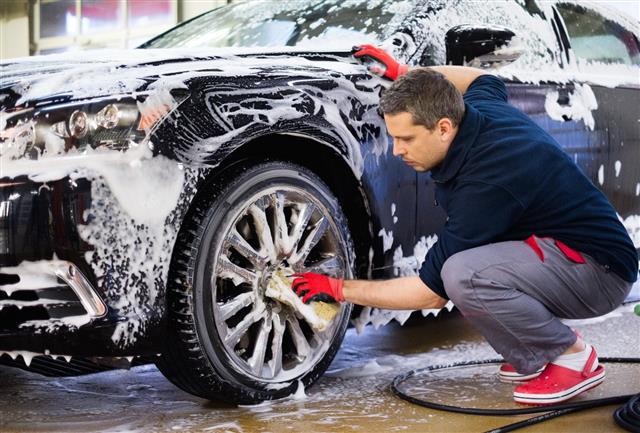Table of Contents
The car wash industry represents a resilient and potentially lucrative business opportunity. With millions of vehicles on the road needing regular cleaning, demand is consistent. Modern consumers increasingly value convenience and professional care for their significant automotive investments, making professional car washes an attractive alternative to DIY efforts. Whether you envision a full-service operation, an express exterior tunnel, a self-serve bay setup, or a mobile service, understanding the path to launch is crucial. This guide provides a detailed roadmap for navigating the complexities of how to start a car wash business and building a foundation for long-term success.
Steps to Start a Car Wash Business
Launching a car wash isn’t simply about buying hoses and soap. It’s a multi-step process requiring careful planning, significant investment, and diligent execution. From validating your concept to opening your doors, each phase builds upon the last. Here, we break down the essential steps involved in bringing your car wash vision to life.
Conduct Market Research
Before investing a single dollar, deep market research is non-negotiable. This step answers the critical question: “Is there a viable opportunity here?”
- Local Demand Analysis: How many vehicles are registered in your target area? What’s the demographic profile (income levels, types of vehicles owned)? Are there dense residential areas, busy commuter routes, or commercial districts nearby?
- Competitive Landscape: Identify all existing car washes (full-service, express, self-serve, mobile, detailing shops). Analyze their pricing, services offered, hours of operation, perceived strengths, and weaknesses. Visit them as a customer. What are they missing? Is there market saturation?
- Customer Preferences: What do local car owners want? Speed? Price? Eco-friendliness? Premium detailing? Convenience (memberships, loyalty programs)? Understanding unmet needs helps define your unique value proposition.
- Economic & Regulatory Climate: Research local water usage regulations, environmental restrictions (especially wastewater discharge), and zoning ordinances. These factors heavily influence location choice and operational model.
Thorough research mitigates risk and informs every subsequent decision, from your business model to your marketing strategy.
Create a Business Plan
A comprehensive business plan is your blueprint and your key to securing financing. It forces you to think critically about every aspect of your venture:
- Executive Summary: A concise overview of your business concept, mission, and goals.
- Company Description: Detail your business structure (LLC, S-Corp, etc.), ownership, location (if known), and the specific type of car wash (express, full-service, self-serve, mobile, hybrid).
- Market Analysis: Summarize your research findings on target market, competition, and industry trends.
- Organization & Management: Outline your management team structure and key personnel roles.
- Services: Detail the specific washing and detailing packages you’ll offer.
- Marketing & Sales Strategy: How will you attract and retain customers? (More on this later).
- Funding Request & Financial Projections: If seeking loans or investors, specify the amount needed and its use. Include detailed financial forecasts: startup costs, operating expenses, revenue projections (based on realistic wash volumes and pricing), profit and loss statements, cash flow analysis, and break-even point. This is arguably the most critical section for demonstrating viability.
- Appendix: Supporting documents like permits, licenses, resumes, market research data.
Your business plan is a living document; revisit and revise it as your business evolves.
Choose the Right Location
Location can make or break your car wash. Key factors include:
- Visibility & Accessibility: High visibility from a major road with easy ingress/egress is paramount. Corner lots are often ideal.
- Traffic Volume & Flow: Target areas with high daily traffic counts, especially commuter routes. Consider traffic flow patterns (e.g., homebound traffic in the evening).
- Demographics: Proximity to residential neighborhoods with sufficient population density and target income levels. Near shopping centers or office parks can also be beneficial.
- Size & Topography: Ensure the lot is large enough for the wash configuration, queuing lanes, vacuum stations, and parking. Relatively flat land simplifies construction and drainage.
- Zoning & Utilities: Verify the property is zoned appropriately for a car wash business. Confirm adequate water supply, sewer capacity (or septic feasibility), electrical power, and gas connections are available. Environmental regulations regarding water reclamation and runoff are crucial.
- Competition Proximity: While some competition can indicate demand, being too close to established players can be challenging. Your market research should guide this.
Don’t rush this step. Secure options on potential sites and conduct thorough due diligence before committing.
Obtain Necessary Licenses and Permits
Navigating the legal and regulatory landscape is essential. Requirements vary significantly by location, but common needs include:
- Business License: Issued by your city or county.
- Employer Identification Number (EIN): From the IRS for tax purposes.
- Sales Tax Permit: To collect and remit sales tax.
- Water Discharge Permits: Critically important. You’ll likely need permits from local water authorities and/or state environmental agencies regulating wastewater (containing detergents, oils, grime) treatment and discharge. Many jurisdictions require closed-loop water reclamation systems.
- Building Permits: For construction or significant renovation.
- Sign Permit: For your exterior signage.
- Health Department Permits: Sometimes required, especially if offering interior detailing.
- Zoning Permits/Variances: Confirming your use is allowed at the chosen location.
Start this process early, as permits, especially environmental ones, can be time-consuming to obtain. Consult with local business development offices and an attorney familiar with car wash regulations.
Invest in Equipment and Supplies
The heart of your operation. The specific equipment needed depends heavily on your chosen model:
- Tunnel/Express Exterior: Conveyor system, high-pressure pre-soak arches, foam applicators, friction cloth/top brushes, side brushes, spot-free rinse arches, tire applicators, dryers (air blowers), chemical delivery systems, water softeners/filtration, reclaim systems (mandatory in most areas), point-of-sale (POS) systems, vacuum stations.
- Self-Serve Bays: Pressure washers (coin/token/card operated), foam brushes, rinse arches, tire cleaners, spot-free rinse options, central vacuum systems (or standalone units), vending machines for towels/wax, payment systems.
- Full-Service: Combines tunnel/express equipment with dedicated interior detailing bays (vacuums, extractors, steam cleaners, compressed air), hand-finishing areas, and often a waiting lounge.
- Mobile: High-capacity pressure washer/hot water system mounted on a trailer or van, water tanks, generator, hoses, vacuums, detailing tools, chemicals. Requires specialized vehicle insurance.
- Universal Supplies: Industrial-grade car wash soaps (pre-soak, tire cleaner, triple foam, wax/sealant), degreasers, glass cleaners, interior protectants, microfiber towels, tire shine, air fresheners.
Prioritize reliability and efficiency. Work with reputable suppliers known for quality equipment and good service support. Factor in ongoing maintenance costs.
Develop a Marketing Strategy
Attracting customers from day one requires a proactive marketing plan:
- Grand Opening: Generate buzz with promotions (free washes, discounts), local media outreach, and community events.
- Digital Presence: Essential! Build a user-friendly website optimized for local search (“car wash near me”). Claim and optimize your Google Business Profile listing. Utilize social media (Facebook, Instagram) for promotions, engaging content (before/after shots, tips), and customer interaction. Consider local SEO strategies.
- Loyalty Programs: Implement wash books, monthly unlimited plans, or app-based membership programs to encourage repeat business and predictable revenue.
- Local Partnerships: Partner with nearby businesses (dealerships, mechanics, offices) for referral programs or corporate accounts.
- Signage: High-quality, visible signage on-site is critical for impulse stops.
- Community Involvement: Sponsor local events, sports teams, or schools to build brand awareness and goodwill.
- Reputation Management: Actively solicit reviews (Google, Yelp) and respond professionally to all feedback, positive and negative.
Your marketing should consistently communicate your unique value (speed, quality, eco-friendliness, convenience) and target your ideal customer.
Hire and Train Staff
Your team is the face of your business, especially in full-service or detailing operations:
- Recruitment: Look for reliable, hardworking individuals with a positive attitude. Prior experience is a plus but trainability is key. Detailers require specific skills.
- Comprehensive Training: Go beyond just washing techniques. Train extensively on:
- Safe equipment operation and chemical handling.
- Standard operating procedures for every service.
- Exceptional customer service skills (greeting, communication, handling complaints).
- Upselling techniques (gently offering higher-tier washes or add-ons).
- Safety protocols and emergency procedures.
- Company Culture: Foster a culture of quality, efficiency, and customer focus. Recognize and reward good performance.
- Scheduling: Ensure adequate staffing for peak times (weekends, sunny days after rain) while managing labor costs effectively.
Investing in your staff reduces turnover, improves service quality, and enhances customer satisfaction.
Provide Excellent Customer Service
In a competitive market, superior customer service is a primary differentiator:
- Consistency: Deliver a consistently clean, dry, and shiny car every time. This builds trust.
- Speed & Efficiency: Respect customers’ time, especially in express models. Minimize wait times.
- Friendliness & Professionalism: Greet customers warmly. Staff should be courteous, helpful, and knowledgeable.
- Problem Resolution: Handle complaints promptly, fairly, and with empathy. Turn a negative experience into a positive one.
- Clean & Safe Environment: Maintain a spotless facility (bays, vacuums, waiting area, restrooms) and ensure the property is well-lit and safe.
- Value Perception: Ensure customers feel they received good value for the price paid. Quality results combined with good service create this feeling.
Loyal customers become repeat customers and your best marketers through word-of-mouth referrals. Focusing relentlessly on customer experience is vital for sustainable growth when figuring out how to start a car wash business.
Conclusion
Starting a car wash business is an exciting venture with significant potential, but it demands meticulous planning, substantial investment, and unwavering commitment. By diligently conducting market research, crafting a solid business plan, securing the ideal location, navigating permits, investing in quality equipment, implementing a savvy marketing strategy, hiring and training a great team, and prioritizing exceptional customer service, you lay the groundwork for a thriving enterprise. The road to success requires hard work, but for those passionate about building a business that meets a consistent market need, mastering the process of how to start a car wash business can lead to a rewarding and profitable destination. Take the first step today – research, plan, and drive towards your entrepreneurial goals.






